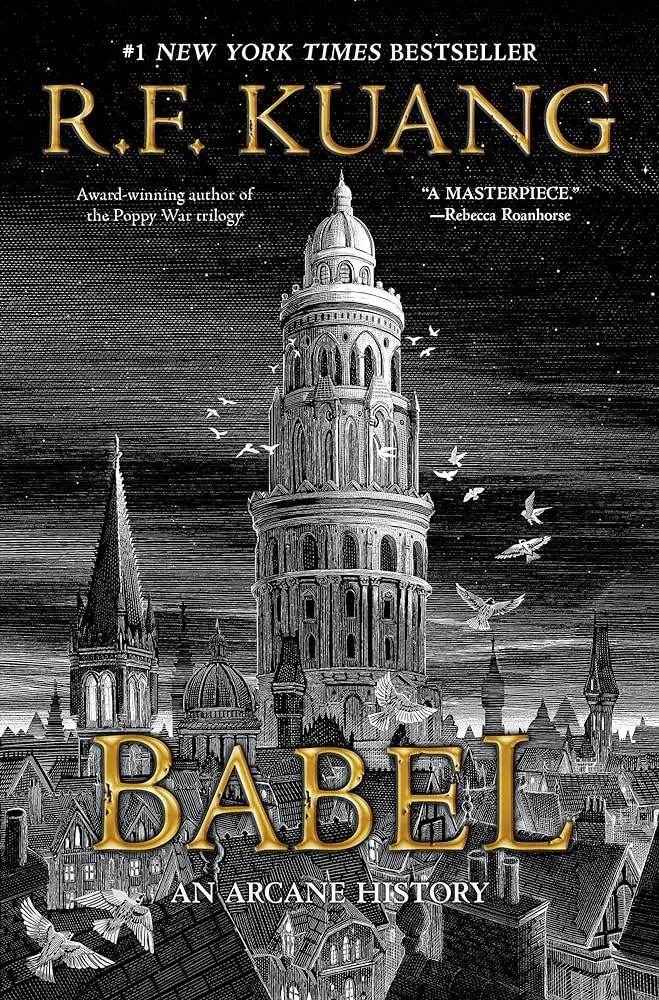Babel: Or the Necessity of Violence: An Arcane History of the Oxford Translators' Revolution - Book Review
Is it alright to talk about this book now? I’m not sure yet, but I am also tired of holding back on it. I’ve waited a year and made sure to avoid all of the other reviews, so now I feel like I’m finally ready. Here goes.
Babel is the story of a British-Cantonese boy’s journey from poverty in Canton to upper middle class London and finally Oxford. HIs journey takes place because of the benevolent patron cough White cough Savior cough, Professor Richard Lowell. He comes in on his majestic horse…I’m sorry…He comes in while this young boy is on the verge of dying from the plague and with the placement of mysterious silver on his chest and some seemingly magical words the boy is healed of the plague. After watching his mother, grandparents, aunt, and everyone else in his home die he is saved by this magical Englishman and his special silver. Oh what a fairytale story.
I would ask for you to excuse my cynicism, but if anyone has read the book, you’d realize that this Englishman is less benevolent and more calculating. Because you see the suffering has to be just so to ensure that things go to plan. After all, you can’t have any loose ends in the realm of colonizer energy.
Anyway, back to the story. Professor Lowell takes the boy in. The boy knows and understands English which is helpful since he is being whisked away to London with no plans of returning. He learned it from his English nanny who read to him. He had four books he learned to read from and those were his prized possessions, which Professor Lowell allowed him to bring. Once in London, the boy was able to choose a name for himself. He had a first name given to him by the Englishwoman that tutored him because he needed a name that “Englishman could take seriously.” He then needed a surname. He couldn’t take Professor Lowell’s surname because God forbid people think the boy was his son <insert eye roll> iykyk. So he picked the name Swift.
This is the story of the life of Robin Swift.
Once in London, Robin gets papers and begins living with Professor Lowell. He has tutors that teach him Greek, Latin, English, etc, because he is slated to go to Oxford and become a translator. Robin is of course excited for any opportunity that keeps him from the impoverished life that Professor Lowell lords over him at any moment of deviation. However, when that doesn’t work surely the beating with a fire poker sufficed.
If you can’t see the RACISM yet, you probably won’t like the rest of the book. If you see the racism and find it outlandish, you may not like the rest of the book. If like me, you saw the racism and said, ‘wow things aren’t so different,’ you may find the book intriguing.
Eventually Robin makes it to Oxford and becomes one of the esteemed students in the tower of Babel. Seriously though, all of the translators train there with plans to use their skills in different languages. Robin is brought there to eventually become a silver worker (aka one of the magical bars that saved his life). He meets everyone in his cohort who are pretty much the family he is assigned if not the family he chooses.
There is Ramy from Calcutta. He is skilled in all things linguistic and even more skilled and telling things like they are. He is quick to get to the root of the issue and pings all of the work they are doing at Babel as a tool of colonization almost from the first meeting. Basically, Ramy is #Bae, and I won’t give any slander from him. He and Robin become close as they are the only two men in their cohort. Also, because they are both non-white they look out for each other because the macro-aggressions are too real when they are walking around Oxford. Nevertheless, because Robin is white-passing, Ramy has no qualms about reminding him of his privileges even when Robin tries to hide behind his fear.
Victoire is a Hatian woman. Her family was enslaved by Frenchman. She and the other female student in her cohort have to walk around with their hair cut short and baggy robes as to not distract the male students. Victoire spends most of her time with her head down and trying to learn as much as possible. Unfortunately, we don’t get a lot of POV from Victoire until closer to the end and the actual end.
Photo by Giammarco Boscaro on Unsplash
This last person is someone people have talked about a lot. She has become a point of many discussions because she is an obvious mirror to many white women. Her name is Letty, and I only have one sentence to describe her.
Letty is the mother of all “Karens” who sought to center herself in every discussion and every situation including the opinions of those reading this book, but she won’t get that option here.
Now that is out of the way, back to the story. The students are at Babel and learning and doing all of the things. For the most part, Robin and Ramy stay together since they live on campus. Victoire and Letty both have to stay off campus. Robin and Ramy’s conversations about the world are often tedious, but necessary. Robin’s mission is to get through this program and become whatever Professor Lowell intended for his own survival because his greatest fear is to become impoverished. Most people understand that. However, once you hear Ramy’s story of being trotted out to perform linguistics for the white people that employed his family, you tend to want more.
Anyway, one night when Robin is on his way home. He notices something strange happening at the tower. He hears something and looks and sees some people appear and one of them looks eerily like him but older. The older gentleman sees him as well while scrambling to pick up the silver they dropped as they escaped the tower. He looks to Robin and asks for help. Robin helps and they disappear again.
Robin later meets with the man he saw. He is in dirty and ratty clothing and has a huge chip on his shoulder. His name is Griffin, and he is Robin’s half-brother. We find out/confirm that they both share the same father: Professor Lowell.
It’s at this point that Robin has to make a choice. He can either pretend that he never saw them, or he can help Griffin’s organization, Hermes. Unfortunately, he’s gotten a peek behind the curtain, and he can’t unsee. Griffin asks him to help them steal more silver. Robin does for a while until he nearly gets caught. Then, he backs out.
Robin is often cast as our avatar in this story, but I honestly saw a lot of my younger self in him. Yes, even the Black woman identified with the young British-Cantonese boy. I remember wanting to do well and be successful because it appeared to guarantee safety. I remember wanting to just keep my head down and do my work. I remember wanting to just be present and not make too much of a fuss.
The older I got, the more I became more like a Ramy. Ramy was ready to join the resistance with Griffin. So was Victoire. They knew all too well what the resistance meant. They also didn’t have any hopes of passing for a high society white person like Robin or living in the luxury of whiteness like Letty. The resistance was their way of fighting for themselves, those that came before, and after them. Resistance was what was supposed to save them.
Ramy tells it better,
“Everything I’ve worked for is this! What, you think I came to Babel because I want to be a translator for the Queen? Birdie (nickname for Robin), I hate it in this country. I hate the way they look at me, I hate being passed around at their wine parties like an animal on display. I hate knowing that my very presence at Oxford is a betrayal of my race and religion…”
Now, I have to admit that I am becoming more of a Griffin. I want to see the whole thing come crashing down by whatever means necessary. It’s all terrible. The whole system is founded and based on the supremacy of the white race and the subjugation of everyone else with extra emphasis on the darker individuals. I want to see it all come to a very certain end. Griffin knows that it will only come that way through the same violence that it was constructed. Most of Hermes is all about letters and flyers. Griffin is about fire. #TeamGriffin
Photo by Joanna Kosinska on Unsplash
There is one specific incident that turns the tides for everyone. It happens on their trip to Canton. Robin sees the extent of what the British empire is doing and how they are doing it. He sees the building of the opium dens and the destruction of homes in exchange for silver. He makes a decision that he is unsure about at first, but really leans into later.
At this point all hell breaks loose and there is no turning back. I can’t spoil everything for you, but I have to say that the trip from Canton was very eventful. They try to go back to normal for a while, but eventually everything falls apart and they have to go into hiding with Hermes. We see their headquarters and Griffin gives Robin a pat on the back.
I really don’t want to spoil the rest of it for those that want to read it, but I will say this. I fully understood everything that happened and agreed with it.
Resistance and justice do not come without bloodshed.
People confuse peace with nice all of the time and this book just puts it in your face. Bluffs were called and I couldn’t have been happier for it.
The ending of the book is hard, and I definitely cried, but it was the ending that was necessary. There was even a really nice twist at the end that kept you thinking of What If’s even after you closed the book, or in my case made the last swipe.
R. F. Kuang is a masterful writer in my opinion. She is the first writer that I have read that has done something that I immediately recognized. She controlled the pace of her book. There were points in the book where she gets into the weeds about the skill of translation and linguistics (because…duh she is a linguist), and you feel as if you are bogged down in the muck, and some may find it annoying. I found it GENIUS. You were in the muck with the students. You were feeling what they were feeling. My head was hurting too!!
Photo by Clark Young on Unsplash
On top of that, being in the muck slowed me down. I was able to take in more of the story and more of the surroundings because I was fully immersed into the world she created. I could smell the old texts and hear the clink and hum of the silver bars. It was an amazing reading experience, and I hope as a writer to hone that skill for my own writing.
I enjoyed this book for so many reasons. It didn’t tip toe around racism and sexism. It threw it in your face and said “Here you go!”
The book club I read it with was radically uncomfortable because I was the only non-white person there. Would they have been more comfortable if I wasn’t there? Possibly. I know I would have been comfortable reading the book with other people or just on my own. I appreciate them for recommending a book in a genre that I hadn’t really read a lot from: “Dark Academia.” That’s about it though. The complexities of this book are difficult to discuss and that’s the point. This isn’t a book you sip tea over but one you kind of agonize over a bit.
For me, a lot of the book was affirming. It was also challenging and relieving toward the end. Once you know the decisions that have to be made and accept them, there is a peace that comes over you. Kuang captured that. She even captured the beauty in letting people make their own choices and stand on their own even if it isn’t the popular choice.
Clearly I enjoyed the book…
I haven’t decided if I want to do comments yet, but if you read this book, I hope you’ve enjoyed it as well.
Until next time…later babes.
Photo by Tim Mossholder on Unsplash





